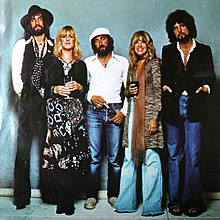
Back فليتوود ماك Arabic فليتوود ماك ARZ Fleetwood Mac AST فلیتوود مک AZB Fleetwood Mac Byelorussian Флийтуд Мак Bulgarian ফ্লিটউড ম্যাক Bengali/Bangla Fleetwood Mac Breton Fleetwood Mac BS Fleetwood Mac Catalan
Fleetwood Mac | |
|---|---|
 Fleetwood Mac in 1977. From left to right: Mick Fleetwood, Christine McVie, John McVie, Stevie Nicks and Lindsey Buckingham. | |
| Background information | |
| Origin | London, England |
| Genres | |
| Discography | Fleetwood Mac discography |
| Years active |
|
| Labels |
|
| Spinoffs | |
| Spinoff of | John Mayall & the Bluesbreakers |
| Members | |
| Past members | |
| Website | fleetwoodmac |
Fleetwood Mac are a British-American rock band formed in London in 1967 by guitarist and singer Peter Green.[6] Green recruited drummer Mick Fleetwood, guitarist and singer Jeremy Spencer and bassist Bob Brunning, with John McVie replacing Brunning a few weeks after their first public appearance. Guitarist and singer Danny Kirwan joined the band in 1968. Christine Perfect, who contributed as a session musician starting with the band's second album, married McVie and joined Fleetwood Mac as an official member in July 1970 on vocals and keyboards, two months after Green left the band; she became known as Christine McVie.
Primarily a British blues band in their early years, Fleetwood Mac achieved a UK number one single in 1968 with the instrumental "Albatross",[7] and had other UK top ten hits with "Man of the World", "Oh Well" (both 1969), and "The Green Manalishi (With the Two Prong Crown)" (1970). After Green's departure, Spencer and Kirwan also left in 1971 and 1972 respectively, with Spencer replaced by Bob Welch and Kirwan replaced by Bob Weston and Dave Walker. By the end of 1974, Weston and Walker had been dismissed and Welch had left, leaving the band without a guitarist or male vocalist. While Fleetwood was scouting studios in Los Angeles, he heard the American folk-rock duo Buckingham Nicks, consisting of guitarist and singer Lindsey Buckingham and singer Stevie Nicks. In December 1974, he asked Buckingham to join Fleetwood Mac, with Buckingham agreeing on the condition that Nicks could also join.
The addition of Buckingham and Nicks gave the band a more pop rock sound and their 1975 album Fleetwood Mac topped the Billboard 200 chart in the United States. The band's succeeding album Rumours (1977) produced four U.S. Top 10 singles and remained at number one on the Billboard 200 for 31 weeks. It also reached the top spot in countries around the world and won the Grammy Award for Album of the Year in 1978. Rumours has sold more than 40 million copies worldwide, making it one of the best-selling albums in history. Although each member of the band went through a breakup (John and Christine McVie, Buckingham and Nicks, and Fleetwood and his wife Jenny Boyd) while recording the album, they continued to write and record together.
The line-up remained stable through three more studio albums, but by the late 1980s began to disintegrate. After Buckingham left in 1987, he was replaced by Billy Burnette and Rick Vito, although Vito left in 1991 along with Nicks. A 1993 one-off performance for the first inauguration of President Bill Clinton reunited the classic 1974–1987 line-up for the first time in six years. A full reunion occurred four years later, and Fleetwood Mac released their fourth U.S. No. 1 album, The Dance (1997), a live album marking the 20th anniversary of Rumours and the 30th anniversary of the band's formation. Christine McVie left in 1998 and they continued as a four-piece, releasing their most recent studio album, Say You Will, in 2003. Christine McVie rejoined in 2014. In 2018, Buckingham was fired[8] and replaced by Mike Campbell, formerly of Tom Petty and the Heartbreakers, and Neil Finn of Split Enz and Crowded House. Christine McVie died in 2022, putting the band's future in question.
Fleetwood Mac have sold more than 120 million records worldwide, making them one of the world's best-selling bands. In 1979, the group were honoured with a star on the Hollywood Walk of Fame. In 1998, the band were inducted into the Rock and Roll Hall of Fame[9] and received the Brit Award for Outstanding Contribution to Music.[10] In 2018, the band received the MusiCares Person of the Year award from The Recording Academy in recognition of their artistic achievement in the music industry and dedication to philanthropy.
- ^ Fleetwood Mac at AllMusic
- ^ a b "Fleetwood Mac". Encyclopædia Britannica. 5 January 2015. Archived from the original on 6 September 2015. Retrieved 4 August 2015.
- ^ Smith, Chris (2006). The Greenwood Encyclopedia of Rock History: From Arenas to the Underground, 1974–80. Greenwood Press. pp. 88, 94–95, 215. ISBN 0-313-32937-0.
- ^ Brackett, Nathan; Hoard, Christian (2004). The New Rolling Stone Album Guide (4th ed.). Fireside. p. 303. ISBN 0-394-72107-1.
- ^ Bennun, David (13 February 2017). "How Fleetwood Mac Invented Goth". The Quietus. Retrieved 20 February 2017.
- ^ "Fleetwood Mac Acceptance Speech at the 1998 Rock & Roll Hall of Fame Induction Ceremony". YouTube.
- ^ "Fleetwood Mac Biography". Rolling Stone. Archived from the original on 11 July 2012. Retrieved 28 August 2017.
- ^ "Fleetwood Mac Fires Lindsey Buckingham". Rolling Stone. 9 April 2018. Archived from the original on 12 June 2018. Retrieved 10 June 2018.
- ^ "Fleetwood Mac Hall of Fame". rockhall.com. Archived from the original on 14 June 2020. Retrieved 6 March 2020.
- ^ "History". BRIT Awards. Archived from the original on 13 February 2019. Retrieved 13 February 2019.
© MMXXIII Rich X Search. We shall prevail. All rights reserved. Rich X Search